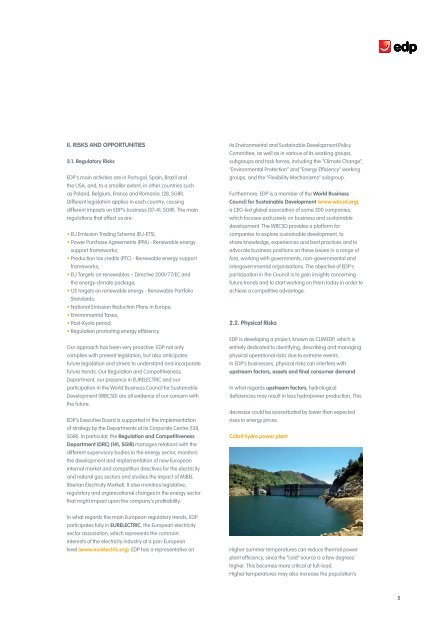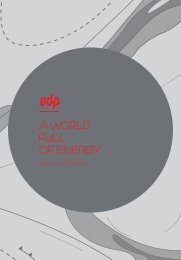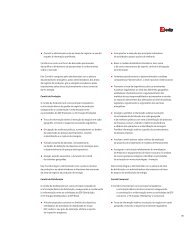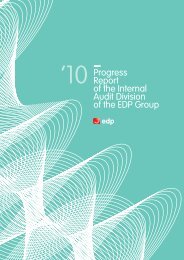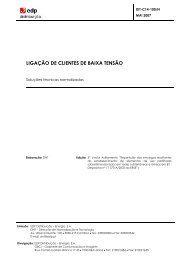CARBON DISCLOSURE PROJECT - EDP
CARBON DISCLOSURE PROJECT - EDP
CARBON DISCLOSURE PROJECT - EDP
Create successful ePaper yourself
Turn your PDF publications into a flip-book with our unique Google optimized e-Paper software.
II. rISkS ANd OppOrTuNITIES<br />
2.1. regulatory risks<br />
<strong>EDP</strong>’s main activities are in Portugal, Spain, Brazil and<br />
the USA, and, to a smaller extent, in other countries such<br />
as Poland, Belgium, France and Romania. (28, SGIR).<br />
Different legislation applies in each country, causing<br />
different impacts on <strong>EDP</strong>’s business (37-41, SGIR). The main<br />
regulations that affect us are:<br />
• EU Emission Trading Scheme (EU-ETS);<br />
• Power Purchase Agreements (PPA) - Renewable energy<br />
support frameworks;<br />
• Production tax credits (PTC) - Renewable energy support<br />
frameworks;<br />
• EU Targets on renewables – Directive 2001/77/EC and<br />
the energy-climate package;<br />
• US targets on renewable energy - Renewable Portfolio<br />
Standards;<br />
• National Emission Reduction Plans in Europe;<br />
• Environmental Taxes;<br />
• Post-Kyoto period;<br />
• Regulation promoting energy efficiency.<br />
Our approach has been very proactive. <strong>EDP</strong> not only<br />
complies with present legislation, but also anticipates<br />
future legislation and strives to understand and incorporate<br />
future trends. Our Regulation and Competitiveness<br />
Department, our presence in EURELECTRIC and our<br />
participation in the World Business Council for Sustainable<br />
Development (WBCSD) are all evidence of our concern with<br />
the future.<br />
<strong>EDP</strong>’s Executive Board is supported in the implementation<br />
of strategy by the Departments of its Corporate Centre (138,<br />
SGIR). In particular, the regulation and Competitiveness<br />
department (drC) (141, SGIr) manages relations with the<br />
different supervisory bodies in the energy sector, monitors<br />
the development and implementation of new European<br />
internal market and competition directives for the electricity<br />
and natural gas sectors and studies the impact of MIBEL<br />
(Iberian Electricity Market). It also monitors legislative,<br />
regulatory and organisational changes in the energy sector<br />
that might impact upon the company’s profitability.<br />
In what regards the main European regulatory trends, <strong>EDP</strong><br />
participates fully in EurELECTrIC, the European electricity<br />
sector association, which represents the common<br />
interests of the electricity industry at a pan-European<br />
level (www.eurelectric.org). <strong>EDP</strong> has a representative on<br />
its Environmental and Sustainable Development Policy<br />
Committee, as well as in various of its working groups,<br />
subgroups and task forces, including the “Climate Change”,<br />
”Environmental Protection” and “Energy Efficiency” working<br />
groups, and the “Flexibility Mechanisms” subgroup.<br />
Furthermore, <strong>EDP</strong> is a member of the World Business<br />
Council for Sustainable development (www.wbcsd.org),<br />
a CEO-led global association of some 200 companies,<br />
which focuses exclusively on business and sustainable<br />
development. The WBCSD provides a platform for<br />
companies to explore sustainable development, to<br />
share knowledge, experiences and best practices and to<br />
advocate business positions on these issues in a range of<br />
fora, working with governments, non-governmental and<br />
intergovernmental organisations. The objective of <strong>EDP</strong>’s<br />
participation in the Council is to gain insights concerning<br />
future trends and to start working on them today in order to<br />
achieve a competitive advantage.<br />
2.2. physical risks<br />
<strong>EDP</strong> is developing a project, known as CLIM<strong>EDP</strong>, which is<br />
entirely dedicated to identifying, describing and managing<br />
physical operational risks due to extreme events.<br />
In <strong>EDP</strong>’s businesses, physical risks can interfere with<br />
upstream factors, assets and final consumer demand.<br />
In what regards upstream factors, hydrological<br />
deficiencies may result in less hydropower production. This<br />
decrease could be exacerbated by lower than expected<br />
rises in energy prices.<br />
Cabril hydro power plant<br />
Higher summer temperatures can reduce thermal power<br />
plant efficiency, since the “cold” source is a few degrees<br />
higher. This becomes more critical at full-load.<br />
Higher temperatures may also increase the population’s<br />
5


